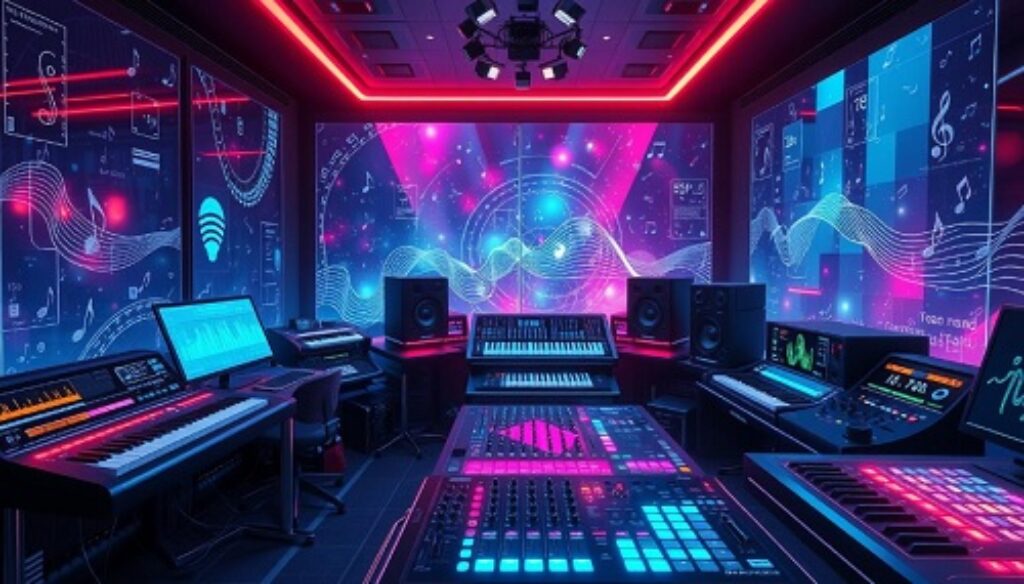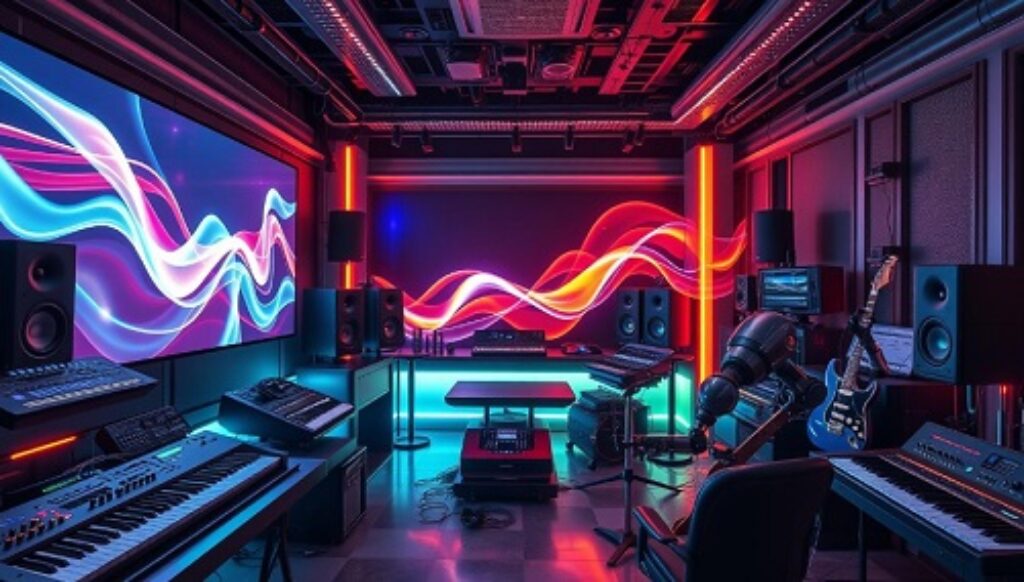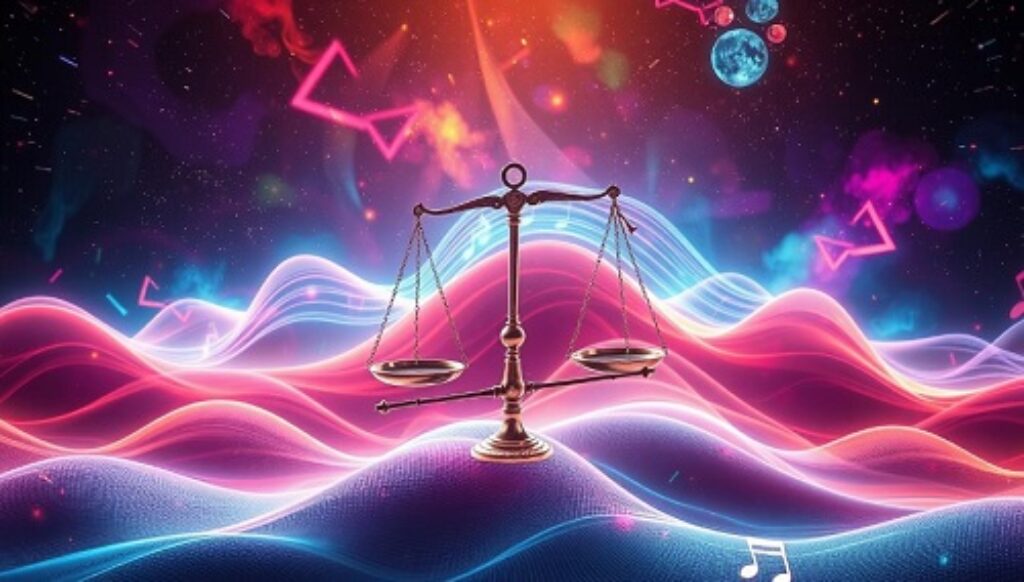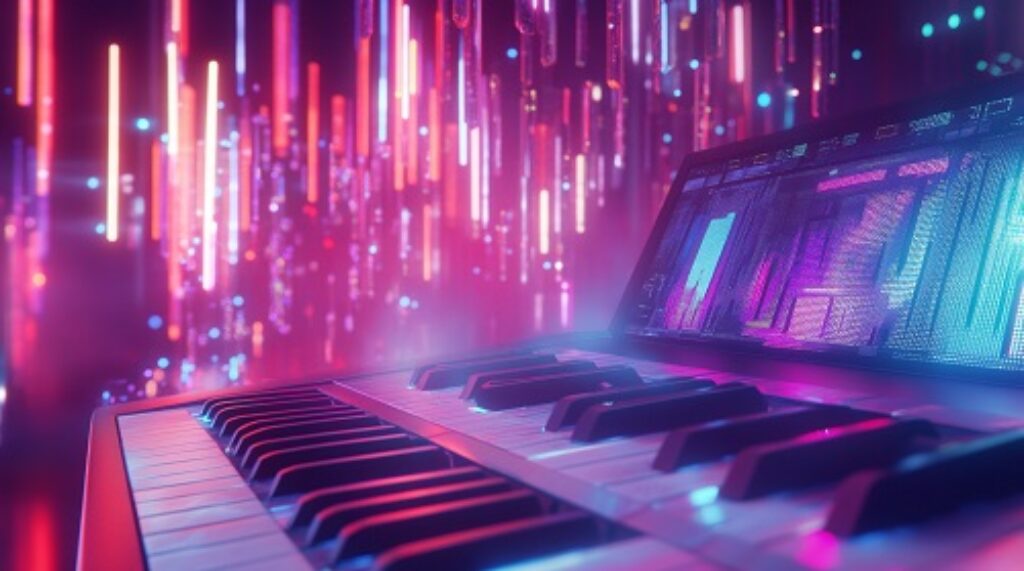Introduction:
Did you know Meta used 20,000 hours of licensed music to train their AI model? This shows how big of an impact generative AI is having on music. It’s important to see how music AI is changing audio production.

Generative AI is moving fast, making it easy to create music in many styles and moods. It’s making music production faster and more creative. This AI revolution is opening up new chances for growth and innovation in music.
Key Takeaways
- Generative AI uses lots of music to train models that make music that sounds like it was made by humans.
- There are legal issues about copyright and ownership as AI music gets more popular.
- Generative AI is getting a lot of money and support from governments and big names in the industry.
- AI tools let you control music production like you would edit an image.
- New platforms let artists mix traditional creativity with AI’s help.
Introduction to Generative AI in Music
Generative AI is changing the way we make music. It uses advanced technology to create new sounds and music. This has made making music faster and more creative.
What is Generative AI?
Generative AI uses machine learning to make new content from old data. In music, it looks at lots of songs to make new tunes, sound effects, and music scenes. Tools like Stable Diffusion use special models to make music faster and better.
Why Generative AI Matters in Music Production
Generative AI is very important for music-making. It lets artists try out new sounds easily. With tools like Soundful and Aiva, anyone can make music, not just pros.
This tech also helps make music for videos, games, and movies. It’s making music creation a new kind of art. This change is bringing together creativity and efficiency, changing how we make and enjoy music.
The Technology Behind Generative AI in Audio
Generative AI in audio has changed music production in big ways. It uses advanced machine learning and *generative adversarial networks* (GANs) to make high-quality audio.
Machine Learning Models
Machine learning is key to making generative AI tools. Models like DeepMind’s WaveNet can make sounds that sound very real. They learn from lots of audio and make new sounds by predicting what comes next.
Google’s MusicLM model learned from 280,000 hours of music. This lets it make complex audio patterns. Variational autoencoders (VAEs) also help by making audio data easier to work with during training. This makes it easier to create new audio variations.
Generative Adversarial Networks (GANs)
*Generative adversarial networks* (GANs) were first used in 2014 and are now crucial in *AI audio production software*. They have a generator and a discriminator. The generator makes new audio, and the discriminator checks if it sounds real. This back-and-forth makes the audio better and better.
Tools like YouTube’s Dream Track and Music AI show how powerful GANs are. Microsoft’s work with Suno and its Copilot AI assistant also shows how GANs can be used in music.
With *machine learning in audio* and GANs, we can see a future where AI-generated music is everywhere. From social media to professional music, it will be a big part of our lives.
Applications of Generative AI in Music Production
Generative AI has changed the music world, making it more creative and efficient. It’s used for everything from new songs to music for social media. Let’s see how these tools are changing music production.
Original Music Composition
Now, making original music is easier, thanks to AI-powered music creation. Tools like Google’s Magenta and OpenAI’s MuseNet let artists try out many genres and styles. They learn from huge music collections, like MusicLM’s 280,000 hours, to make music that sounds good together.
Games like “No Man’s Sky” and “Detroit: Become Human” show how AI music can improve games. In “Horizon Zero Dawn,” the music changes based on what the player does. Big names like Spotify are adding AI-made music, showing how big AI’s role is getting in music.
Music Generation for Social Media
AI music tools are big in making music for social media. They can make tracks for different moods or themes, great for Instagram, TikTok, and YouTube. A lot of teens and kids use these tools, showing how popular AI music is.
Companies like Boomy let users make and share their music and even make money from it. Tools like Stable Audio use text to make custom music tracks. YouTube’s new AI tools, Dream Track and Music AI help creators make their videos better with AI music.
Social media music generation benefits from AI, giving users lots of ways to make unique content.
| Platform | Key Feature | Impact |
| Google Magenta | Autonomous Composition | Generates diverse genres and styles |
| OpenAI’s MuseNet | Long Short-Term Memory (LSTM) Networks | Produces harmonious compositions |
| Microsoft’s Copilot AI | Collaboration with Suno | Original song generation |
| Boomy | Community Music Creation | Users can share and monetize music |
| YouTube’s Dream Track and Music AI | DeepMind Collaboration | Enhances video content with custom tracks |
Benefits of Using Generative AI in Music Production
Generative AI is changing the music world. It brings new benefits that make making music faster and more creative. Platforms like Google’s MusicLM and Meta’s MusicGen are leading the way for artists and producers.
Speed and Efficiency
AI in music production speeds things up a lot. Google’s MusicLM can make music at 24 kHz which sounds great for minutes. Meta’s MusicGen can also create high-quality samples from text or melodies. This tech cuts down the time and effort needed to make music, making the creative process smoother.
Creative Freedom of Generative AI
AI doesn’t just speed things up; it also opens up new creative doors. It helps artists come up with many new musical ideas. Tools like iZotope’s RX8 let producers work with vocals or remove them, making remixes easier. AI also lets musicians mix lyrics with AI-made melodies for richer songs.
This use of AI in music lets artists try out new sounds and ideas they couldn’t before.
Let’s look at the main benefits of using generative AI in music production:
| Benefit | Traditional Methods | Generative AI Methods |
|---|---|---|
| Music Production Efficiency | Time-consuming, labor-intensive processes | Significant reduction in production time and resources required |
| Creativity in Music | Conventional limits of human creativity | Expanded creative potential with diverse and novel musical ideas |
| Resource Allocation | High costs and extensive manpower | Optimized use of resources with lower costs |
| Access to Tools | Limited to experienced producers and musicians | Accessible to both novice and professional musicians |
AI is changing music production in big ways. It makes making music faster and opens up new creative paths. As technology gets better, we’ll see even more new ways to express music.
Popular Generative AI Music Tools
Many generative AI music tools are changing how we make music. They show the power of music AI technology in the music world. Let’s look at two big ones: Soundful and MuseNet by OpenAI.
Soundful
Soundful is a top example of how artificial intelligence audio tools are changing music-making. It lets you create unlimited songs for videos, podcasts, and games. You can also customize songs live, changing things like tempo and volume.
Soundful works with MIDI, MP3, and WAV files, great for pros. It has two pricing plans: $16.99 a month or $19.99 a month. This tool makes making music faster and more creative, with many styles to choose from.
OpenAI’s MuseNet
OpenAI’s MuseNet is a big step in AI music. It can mimic famous musicians, letting you create songs that sound like theirs. MuseNet works with many music styles, from classical to modern, offering endless options for producers.
MuseNet is known for learning musical styles and helping musicians make music that fits their style. It balances tech and creativity, making sure the music sounds great and new.
| Platform |
Key Features | Pricing |
|---|---|---|
| Soundful | Unlimited song generation, real-time customization, various output formats | Annual: $16.99/month, Monthly: $19.99/month |
| MuseNet | Simulates musician styles, multiple genres, personalized music creation | Based on usage and subscription options |
These artificial intelligence audio tools help music makers work faster, save time, and explore new sounds in music production.
Using Generative AI in Music and Audio Production
Generative AI has changed the way musicians and producers make music. These tools help improve music production, making it more innovative and creative.

Choosing the Right Platform
Choosing the right AI music tool is key. It should match your musical goals and technical skills. There are many tools out there, each with its own strengths and uses:
| AI Music Tool | Features | Best For |
|---|---|---|
| Ditto Music Mastering | Instant audio mastering | Optimal listening experiences |
| Orb Producer Suite | Infinite music patterns and loops | Generating melodies and synth sounds |
| Amper | Unique music compositions | Content creation |
| AIVA | Emotional soundtracks | Media content |
| MuseNet | Multi-instrument compositions | Varied music styles |
| WavTool | Text-to-music generation | New sounds and compositions |
| Brain. FM | Music to enhance focus | Improving concentration |
| Ecrett Music | Scene-based music | Atmospheric compositions |
| Boomy | Original music creation | Social media |
Generating and Refining Music
After picking the right AI tool, you start making and improving AI music. These tools mimic the brain, analyzing lots of music to create new tunes. You can set things like genre and tempo to match what you want.
For example, MusicGen in Meta’s AudioCraft suite lets you make music from text or melodies. This makes making music easy and quick.
It’s also important to check the quality and originality of the music. Tools like Ditto Music Mastering make sure the sound is great on any device. AIVA can also make the music more emotional.
By adjusting settings and using AI suggestions, you can make music that sounds great and is truly yours. Generative AI opens up endless creative possibilities in music production. With the right tools and approach, musicians and producers can explore new artistic heights.
How Artists and Producers Are Adapting
AI is changing the music industry fast. Artists and producers are finding new ways to use these technologies. They’re using AI to make, improve, and master their music.
Case Studies of AI-First Artists
AI-first artists are changing the music world. They use AI for making music and building their unique styles. For example, Humtap has worked on AI for 100,000 hours with music experts and companies. Their app lets users make music easily, showing how AI helps in music creation.
Loudly gives creators many options to customize their work. This shows how AI helps artists go beyond their limits. LANDR’s AI masters over 330,000 songs a month, more than all American studios combined. This shows how AI is making music production better and easier.
Traditional vs. AI-Augmented Creativity
Traditional and AI-augmented creativity are working together in music. AI helps artists try new sounds and styles. For example, AI looks at big data to find patterns in music, helping artists make hits.
CloudBounce’s dBounce aims to offer AI help for making, mixing, and mastering music. This shows how AI is making production easier while keeping the artist’s creative touch. CloudBounce also sees a big need for better audio quality, with 300 hours of video uploaded to YouTube every minute.
But, AI in music also brings up questions about originality and the value of human musicians. Still, AI’s promise is big. It makes high-quality music-making available to more artists.
| Aspect | Traditional Creativity | AI-Augmented Creativity |
|---|---|---|
| Speed of Production | Slower, more manual intervention | Faster, aided by AI tools |
| Creative Freedom | Limited by human capacity | Expanded by AI’s capabilities |
| Accessibility | Potentially cost-prohibitive | More accessible due to AI’s cost-effectiveness |
| Personalization | Highly personalized by the artist | Enhanced with AI customization options |
Challenges and Ethical Considerations Using Generative AI
Generative AI in music production is a groundbreaking field. It brings up several challenges and ethical concerns. We need to look into the implications of copyright and ownership, as well as the quality and originality concerns.

Copyright and Ownership
One big challenge is figuring out copyright issues. With AI-generated music, it’s unclear who owns the rights. Is it the AI creator, the user, or the AI itself? This confusion can lead to big disputes, like the case of “Heart on My Sleeve” which sparked a copyright debate.
Deepfake vocal technology adds to the problem. It uses deep learning to make voices sound real. This tech shows AI’s creative potential but raises ethical worries about spreading false info and misuse. We need strict rules to protect the music industry’s integrity.
Quality and Originality Concerns
AI-generated music’s originality is a big worry. Tools like OpenAI’s Jukebox and ChatGPT make music creation easy. But, the music might lack human-made music’s real touch and feel. For example, Rachel Meddings used an AI algorithm to help with writer’s block, showing AI’s creative help but also sparking debates on originality.
AI music generation could also make music sound the same, losing diversity. AI might just copy patterns from past music. Also, biases in training data can keep stereotypes alive and affect representation in the music world.
| AI Tool | Function | Ethical Concerns |
|---|---|---|
| Riffusion | Creates music using spectrograms from images of sound | Debates on attribution and use of visual data |
| ChatGPT | Generates songs from text prompts | Questions about originality in AI-generated music |
| Deepfake Vocal Technology | Creates realistic voices | Potential for misuse and misinformation |
| OpenAI’s Jukebox | Generates music in various genres and styles | Maintaining ethics in AI music creation |
Today, as we follow in the footsteps of pioneers like Alan Turing and Max Mathews, we face new ethical questions in AI music. It’s crucial to tackle these challenges to ensure AI’s responsible use in music.
Conclusion:
Future of AI in Music Production
The future of music production with AI looks exciting. It will break down genre walls and make making music together easier. AI systems are getting better at writing music, making lyrics, and creating new sounds. They learn from old music to make new, cool patterns.
Breaking Genre Boundaries
AI is changing how we mix different music styles. Tools like IBM’s Watson Beat help producers make unique sounds. Now, AI artists and tools like Meta’s MusicGen can make music from just text, leading to new kinds of music.
Enhanced Collaboration Tools
AI is also making it easier for artists to work together, no matter where they are. Companies like iZotope and Landr use AI to improve music quality. AI is even changing live shows, making music adapt to the audience and setting.
As AI gets more advanced, we’ll talk more about who gets credit for the music. It’s important to see AI as a partner, not a replacement. With tools like Spotify’s AI DJ and apps like Endel and Brain.fm, AI is changing how we enjoy music. The future looks bright, with lots of new innovations on the way.
FAQ
Generative AI uses machine learning to create new content. It makes new music by learning from old songs.
It’s key in music production because it makes making music faster. It gives musicians new tools and lets anyone make music, leading to more unique songs.
Machine learning models are algorithms that learn from data to predict or create new patterns. In music, they learn from songs to make new music.
GANs are models with two networks, a generator and a discriminator. The generator makes samples, and the discriminator checks them, helping them get better.
Generative AI helps make original music, create tracks for social media, and assist in music production. It has huge potential for film, ads, and games.
Generative AI helps make original music, create tracks for social media, and assist in music production. It has huge potential for film, ads, and games.
The big wins are making music faster and more efficient. It gives more creative freedom and lets you try new styles without the usual limits.
Top tools include Soundful and OpenAI’s MuseNet. These tools help producers make and improve their music with AI tech.
Pick a platform that fits your music style and needs. Make sure it makes high-quality music and consider copyright issues.
Start by setting your music type and tempo on the platform. Then, tweak the music to get the sound you want, making sure you have the right files for editing.
Artists and producers are using AI by trying out AI-first artists and adding AI tools to their creativity. Platforms like Loudly offer lots of customization to help with this.
Big challenges include dealing with copyright and ownership, making sure AI music is good and original, and handling ethical worries about AI’s effect on jobs and music culture.
The future looks bright with AI breaking genre limits, offering new tools for working together and bringing us AI artists and experiences. This will make making music more open and creative.
Discover more AI Essential Skills
Source Links
- https://www.westonemusic.com/latest-news/2024/02/26/generative-ai-and-production-music/ – GENERATIVE AI AND PRODUCTION MUSIC – West One Music Group
- https://blog.adobe.com/en/publish/2024/02/28/adobe-research-audio-creation-editing – Here’s how generative AI is about to revolutionize audio creation and editing | Adobe Blog
- https://www.mccormick.northwestern.edu/news/articles/2024/02/centering-sound-artists-in-generative-music/ – Centering Sound Artists in Generative Music
- https://medium.com/@sanjeeva.bora/the-rise-of-generative-ai-in-audio-revolutionizing-music-production-stable-audio-kicking-the-8ee289f1616f – The Rise of Generative AI in Audio, Revolutionizing Music Production: “Stable Audio” kicking the…


